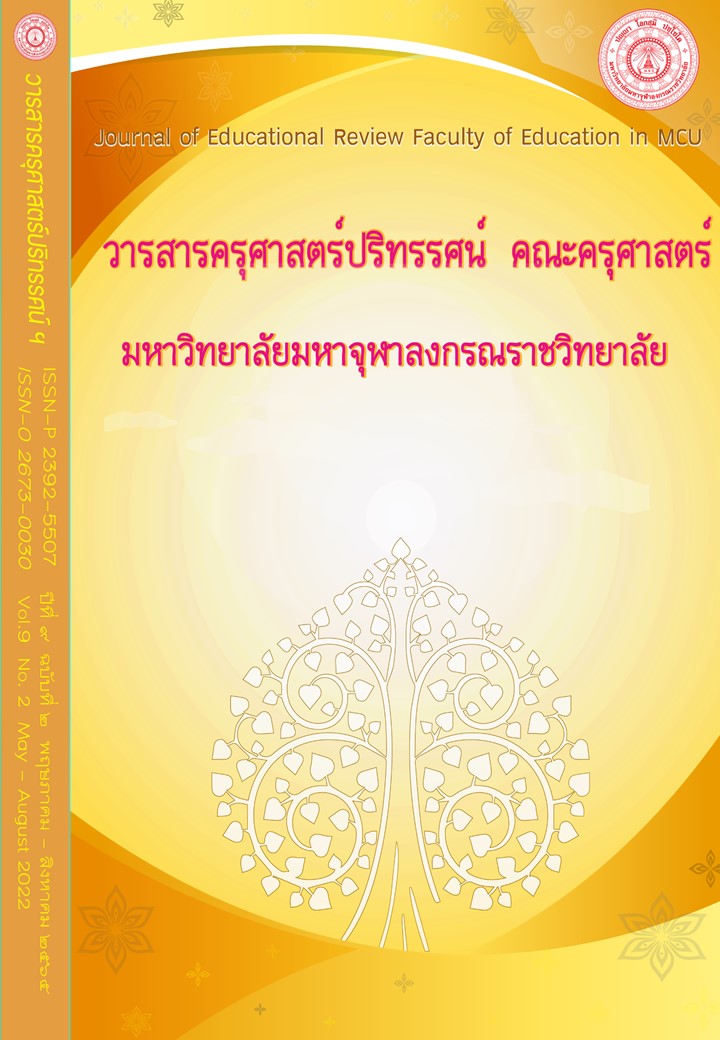THE PRIORITY NEEDS OF TEACHER DEVELOPMENT OF HORWANG SCHOOL BASED ON THE CHARACTERISTICS OF INNOVATORS
Main Article Content
Abstract
The objectives of this research were 1) to study the current and desirable conditions of Horwang School teacher development in accordance with the Concept of Characteristics of Innovators and 2) to study the needs of Horwang School teacher development in accordance with the Concept of Characteristics of Innovators. This study used a descriptive research methodology. The population of this research was 145 administrators and teachers of Horwang School. The questionnaire was used as a research instrument for data collection. Data were analyzed using statistics to determine frequency, percentage, arithmetic mean, standard deviation and Modified Priority Needs Index (PNImodified ). The results of this research were as follows: 1) The overall current condition of teacher development at Horwang School in accordance with the Concept of Characteristics of Innovators was at a high level. The overall desirable condition of teacher development at Horwang School in accordance with the Concept of Characteristics of Innovators was at the highest level. The overall need score for teacher development at Horwang School in accordance with the Concept of Characteristics of Innovators was 0.138 (PNImodified = 0.138). When individual aspects were considered, an aspect with the highest mean was Inspiration(PNImodified = 0.175), followed by Vision and Leadership (PNImodified = 0.156), Problem-solving ability(PNImodified = 0.147), Risk-taking (PNImodified = 0.145), Flexibility and patience (PNImodified = 0.142), Self-confidence (PNImodified = 0.112), and Competent practitioners and teamwork (PNImodified = 0.099).
Article Details

This work is licensed under a Creative Commons Attribution-NonCommercial-NoDerivatives 4.0 International License.
ทัศนะและความคิดเห็นที่ปรากฏในบทความในวารสารฉบับนี้ถือเป็นความรับผิดชอบของผู้เขียนบทความนั้นเพียงผู้เดียว และไม่ถือเป็นทัศนะและความรับผิดชอบของกองบรรณาธิการ
กองบรรณาธิการขอสงวนสิทธิ์ในการคัดเลือกบทความลงตีพิมพ์และจะแจ้งให้เจ้าของบทความทราบหลังจากผู้ประเมินบทความตรวจอ่านบทความแล้ว
ต้นฉบับที่ได้รับการตีพิมพ์ในวารสารครุศาสตร์ปริทรรศน์ คณะครุศาสตร์ มหาวิทยาลัยมหาจุฬาลงกรณราชวิทยาลัย ถือเป็นกรรมสิทธิ์ของคณะครุศาสตร์ มหาวิทยาลัยมหาจุฬาลงกรณราชวิทยาลัย ห้ามนำข้อความทั้งหมดหรือบางส่วนไปพิมพ์ซ้ำ เว้นเสียแต่ว่าจะได้รับอนุญาตจากมหาวิทยาลัยฯ เป็นลายลักษณ์อักษร
References
จตุรงค์ ธนะสีลังกูร. (2559). อัตลักษณ์ภาวะผู้นำของผู้อำนวยการโรงเรียน : การปฏิบัติแห่งความเป็นเอกัตบุคคล. วารสารวิจัยเพื่อพัฒนาสังคมและชุมชน มหาวิทยาลัยราชภัฏมหาสารคาม. 3(2). 19-30.
ณัฐณภรณ์ เอกนราจินดาวัฒน์. (2563). ภาวะผู้นำทางการบริหารการพัฒนา. แหล่งที่มาhttps://pubhtml5.com/egty/odwe/basic. สืบค้นเมื่อ 17 พ.ค. 2564.
ตรีทิพย์ บุญแย้ม. (2554). ปัจจัยเชิงสาเหตุพหุระดับที่มีอิทธิพลต่อพฤติกรรมสร้างนวัตกรรมระดับบุคคลและระดับกลุ่มงานเพื่อสร้างนวัตกรรมผลิตภัณฑ์ในบริษัทเอกชนของไทย. ดุษฎีนิพนธ์วิทยาศาสตรดุษฎีบัณฑิต. มหาวิทยาลัยศรีนครินทรวิโรฒ.
ประภาภรณ์ พลเยี่ยม. (2560). การพัฒนาทักษะการทำงานเป็นทีมโดยใช้การจัดการเรียนรู้แบบจิ๊กซอว์ 2 ร่วมกับสื่อสังคมออนไลน์ สำหรับนักเรียนชั้นมัธยมศึกษาปีที่ 5. วิทยานิพนธ์ครุศาสตรมหาบัณฑิต. มหาวิทยาลัยราชภัฏมหาสารคาม.
พนิดา มารุ่งเรือง. (2552). ความเชื่อมั่นในตนเองของบัณฑิตมหาวิทยาลัยธนบุรีก่อนเข้าสู่สถานประกอบการ. รายงานการวิจัย. มหาวิทยาลัยธนบุรี.
พฤทธิ์ ศิริบรรณพิทักษ์. (2561). การบริหารการศึกษาใหม่: New Education Governance. การประชุมวิชาการราชบัณฑิตสัญจร. เอกสารประกอบการประชุมของ (ราชบัณฑิตยสภา). ชลบุรี: มหาวิทยาลัยบูรพา.
พิรุณ ศิริศักดิ์. (2562). มหกรรมการศึกษาเพื่อพัฒนาวิชาชีพครูครั้งที่ 12 ชูหลักสูตร เทคโนโลยีดิจิทัล “ครู” เป็นต้นแบบสร้างนวัตกร. แหล่งที่มา https://www.prachachat.net/education/news-389049. สืบค้นเมื่อ 18 ม.ค. 2564.
เลิศศิลป์ รัตนมุสิก และคณะ. (2562). รายงานผลการปฏิบัติงานโรงเรียนหอวัง กรุงเทพมหานคร ปีการศึกษา 2562. กรุงเทพมหานคร: โรงเรียนหอวัง.
วสันต์ สุทธาวาศ และพิทักษ์ ศิริวงศ์. (2558). ความเป็นนวัตกรทางการศึกษาขั้นพื้นฐานในภาครัฐ: การศึกษาทฤษฎีฐานราก. วารสารวิชาการ Veridian E-Journal, Silpakorn University ฉบับภาษาไทย สาขามนุษยศาสตร์ สังคมศาสตร์ และศิลปะ. 8(2). 281-300.
วสันต์ สุทธาวาศและพิทักษ์ ศิริวงศ์. (2558). ปัจจัยที่ส่งผลต่อพฤติกรรมสร้างนวัตกรรมระดับบุคคลในสานักงานคณะกรรมการ การศึกษาขั้นพื้นฐาน. Veridian E-Journal ฉบับมนุษยศาสตร์ สังคมศาสตร์ และศิลปะ. 8(1).
Goodson and Hargreaves. (2005). Educational Change Over Time? The Sustainability and Nonsustainability of Three Decades of Secondary School Change and Continuity. Research Article. Spencer Foundation-funded project of long-term educational.
Kanter, R. M. (1988). When a Thousand Flowers Bloom: Structural, Collective, and Social Conditions for Innovation in Organization. Research in Organizational Behaviour. 10. 169-221.
Krejcie, R. V. and Morgan, D. W. (1970). Determining Sample Size for Research Activities. Educational and Psychological Measurement. 30(3). 607-610.


